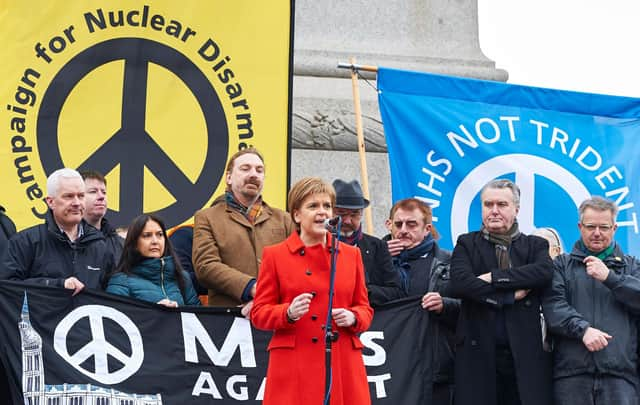Scottish independence: SNP needs to get real about foreign policy. Flowery moralpolitik doesn't cut it in the real world – Alastair Stewart


As the Scottish Government prepares for its planned independence referendum in October next year, it has been publishing a series of policy papers, called Building a New Scotland, “to give people the information they need to make an informed choice about Scotland's future”. All very good.
But if there is a countdown to a second vote, we need to understand an independent Scotland's foreign and defence situation now. Would, for example, Scotland send any and all materiel to aid Ukraine's plight? Could we afford to do so? Would we host Ukrainian refugees en masse, and if so, how?
Advertisement
Hide AdAdvertisement
Hide Ad“Scotland has always been an outward-looking, innovative and caring nation,” notes the SNP's website. “By maintaining Scotland's place in the world as a good global citizen, we can provide leadership on global issues such as equality, sustainable development, climate justice and fair trade.”
If Scotland is serious about a unilateral foreign policy, it should be demonstrating a pragmatism that is worlds away from today's flowery moralpolitik. We need policies and strategic outlines for how we would act, not descriptions of what we wish we could do. War is nasty, peace is good. Nukes are bad, ban them all. Occam's razor is too readily deployed as a social media tool by the SNP and Scottish Greens.
Before entering a power-sharing arrangement with the SNP last year, the Scottish Greens published an Instagram post of co-leader Patrick Harvie protesting at the Faslane naval base. They were marking the 76th anniversary of the Hiroshima nuclear bombing. The post was interesting for its remarkable generalisation that "like most people in Scotland we look at the destruction, the death and the radioactive aftermath and say 'never again'".
Such tweetable moral maxims are taken as gospel by their supporters. But instead of ignoring the facts of the world and recognising ethical grey areas, those in government need to reflect on complex realities if a second independence vote is coming. Manichaeism is not the basis of foreign policy – it is not a case of good and evil but of national interest.
The real crux of the argument about nuclear weapons is more complicated than whether Scotland would renounce them. Would it discontinue any indirect activities to their manufacture? Would the same be true for biological and chemical weapons? Would Scotland permit foreign bases, troops and equipment as part of broader defence pacts or go as far as hosting tactical nuclear bombs, as Germany does?
Nuclear weapons are not evil; it's what you do with them. Nor are they the playthings of right-wing governments. Labour Prime Minister Clement Attlee commissioned Britain's nuclear deterrent in 1947. Former leader Jeremy Corbyn wrestled with the seemingly impossible task of reconciling this history with the party's pro and anti-nuclear factions.
It is not much to ask for more information on a Scottish defence strategy, which would be the de facto holding position for whatever inaugural government and party takes the reins during a transition period or immediately after independence. Such preparation would decrease the country's vulnerability to foreign attack and manipulation as Europe finds itself embroiled in the Ukrainian crisis.
Only SNP arrogance would presume they could be the harbingers, caretakers and leaders of a new nation and not need to do their homework now. Complaining Scotland does not have the policy levers to act, but not giving costed and detailed plans to the electorate of what they would do with them on something as serious as international affairs, is insane.
Advertisement
Hide AdAdvertisement
Hide AdWould a ‘Republic of Scotland’ seek regional influence if the aims were ‘good'? Would we block, embargo and sanction countries with dubious human rights records? How much would an embassy network cost, given the number of Scots living and working abroad?
Surely planning for independence requires foundation-block ideas. Enshrining the removal of nuclear weapons into a Scottish constitution – a commitment in 2014 – sounds nice but is dangerously naive. Independence necessitates preliminary discussions about treaties, realpolitik, environmental policy, international security, and an abundance of other factors that need consensus and leadership.
Scotland could only respond to events; it could hardly reshape the realities that have plagued international relations for centuries. Significant hard military power would be beyond our abilities. Soft power, rooted in reputation and culture, must be established and politicised with clear objectives. It is not enough to say you mean well and point to tartan and whisky.
All countries bend their principles to foreign policy realities; look a little closer in Scotland, and such compromises can be seen.
Former First Minister Alex Salmond was on the wrong side of history when he condemned Britain's involvement in Nato airstrikes on Yugoslavia as an “unpardonable folly”. The Scottish Government provoked general international ire over the release of Lockerbie bomber Abdelbaset al-Megrahi in 2009. In 2012, Salmond allegedly snubbed the Dalai Lama's visit to Scotland to assuage Chinese government sensibilities. And he notoriously said Russian president Vladimir Putin's patriotism was “entirely reasonable”.
Last year the now-in-government Greens called on the Scottish Government to stop support for companies profiting from the war in Yemen. Climate campaigners have confronted Nicola Sturgeon over her failure to oppose some new North Sea oilfields.
A civilised global society is an illusion; the current epoch is organised along the geographical, political and economic lines of the Second World War, even if those boundaries have moved since the Cold War and 9/11 with Russia's invasion of Ukraine shifting them once more.
Scottish exceptionalism and the notion we can somehow buck this trend is astronomically foolhardy. Scotland must toughen up to an unrelenting global environment. If we are pushed, will we push back? And if so, with what?
Comments
Want to join the conversation? Please or to comment on this article.